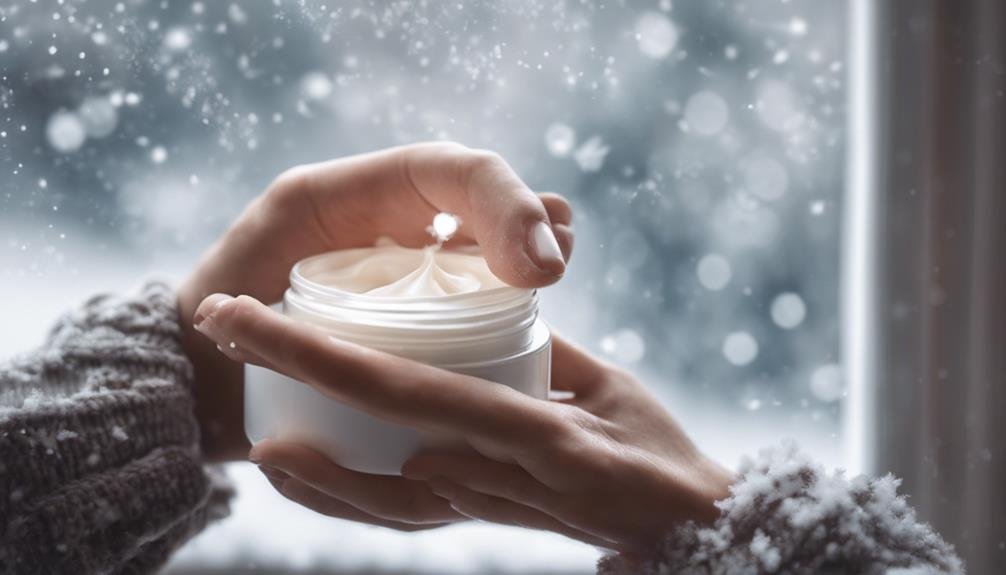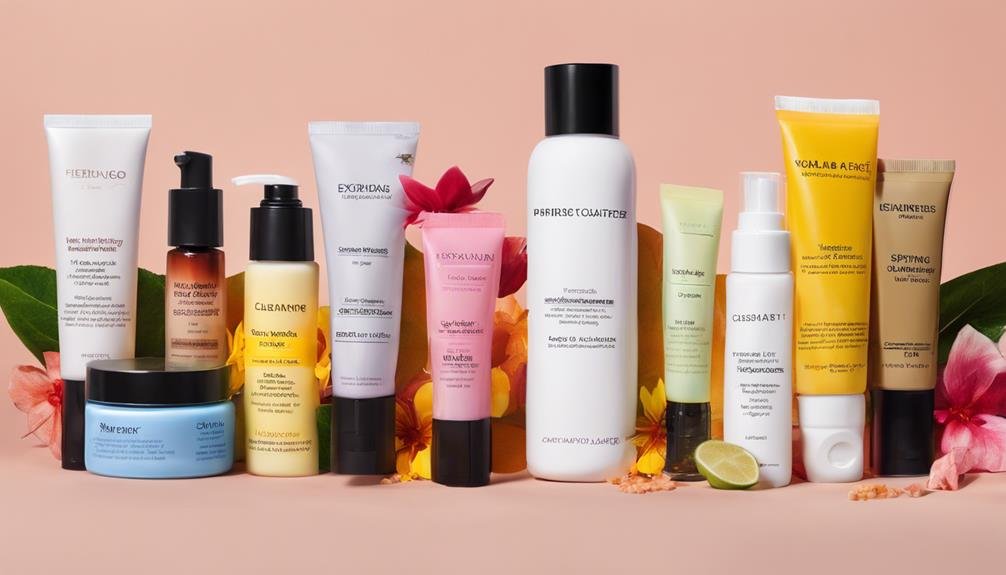"Cherishing Little Steps - A Haven for Baby and Family Journeys"
Top Skincare Tips for Every Season
Imagine your skin as a canvas that changes with the seasons, adapting to the elements around you. Each season brings unique challenges and opportunities for your skincare routine. From combating dry winter air to protecting against harsh summer sun, your skin requires different care throughout the year. By tailoring your skincare regimen to the seasons, you can optimize your skin's health and radiance.
Key Takeaways
- Adjust skincare routine with the seasons for optimal skin health.
- Focus on hydration and protection year-round.
- Use appropriate SPF sunscreen daily.
- Incorporate gentle exfoliation for a glowing complexion.
- Choose skincare products based on the climate and humidity levels.
Winter Skincare Tips

During the winter months, your skin faces unique challenges that require special care and attention. The cold and dry air can strip your skin of its natural oils, leading to dryness, flakiness, and irritation. To combat these effects, it's crucial to adjust your skincare routine accordingly.
Firstly, focus on hydration. Opt for a rich moisturizer that contains ingredients like hyaluronic acid, glycerin, or shea butter to lock in moisture and prevent dryness. Consider using a humidifier in your home to add moisture to the air and prevent your skin from becoming too parched.
Secondly, be gentle with your skin. Avoid harsh exfoliants and opt for a mild cleanser that won't strip your skin of its natural oils. Additionally, limit hot showers and opt for lukewarm water to prevent further drying out your skin.
Lastly, don't forget sun protection. Even in the winter months, UV rays can still damage your skin. Apply a broad-spectrum sunscreen with an SPF of 30 or higher to exposed areas to protect your skin from harm. By following these winter skincare tips, you can keep your skin healthy, hydrated, and glowing throughout the colder months.
Spring Skincare Advice
As the winter chill recedes and nature blossoms anew, your skincare routine should also transition to meet the changing needs of your skin during the spring season.
During spring, focus on hydration and protection. Swap out heavy winter moisturizers for lighter ones to prevent clogged pores in the warmer weather. Look for products with hyaluronic acid to keep your skin hydrated without feeling greasy.
Don't forget sunscreen! As the sun's rays get stronger, it's crucial to protect your skin from harmful UV damage. Opt for a broad-spectrum sunscreen with at least SPF 30 and remember to reapply throughout the day, especially if you're spending time outdoors.
Spring is also a great time to exfoliate and brighten your skin after the dullness of winter. Incorporate a gentle exfoliator into your routine to slough off dead skin cells and reveal a fresh, glowing complexion. Remember to listen to your skin's needs and adjust your routine accordingly as the weather continues to warm up.
Summer Skincare Essentials

Enhance your summer skincare routine with these essential tips to keep your skin healthy and radiant under the sun's intense rays. As the temperature rises, it's crucial to adjust your skincare regimen to protect your skin from the harsh summer conditions.
Firstly, always remember to apply sunscreen with at least SPF 30 before heading out. Reapply every two hours, especially if you're swimming or sweating. Hydration is key during the summer months, so drink plenty of water to keep your skin plump and glowing. Opt for lightweight, oil-free moisturizers to prevent clogged pores and breakouts in the heat.
Exfoliation is essential to slough off dead skin cells and reveal a fresh complexion. However, be gentle with exfoliation, as the sun can make your skin more sensitive. Incorporate antioxidants like Vitamin C serums to combat sun damage and brighten your skin.
Fall Skin Care Routine
Transitioning from the intense heat of summer to the cooler temperatures of fall requires a shift in your skincare routine. During fall, the air becomes drier, which can lead to skin dehydration. To combat this, consider switching to a heavier moisturizer to provide extra hydration. Look for products containing ingredients like hyaluronic acid or glycerin for added moisture retention.
Additionally, exfoliation remains crucial in the fall to remove dead skin cells and promote cell turnover. Opt for a gentle exfoliator to prevent irritation as the weather changes.
Don't forget to continue applying sunscreen daily, as UV rays can still cause damage in the fall.
Lastly, consider incorporating products with antioxidants like vitamin C to protect your skin from environmental stressors. By adjusting your skincare routine to accommodate the seasonal changes, you can help maintain healthy and glowing skin throughout the fall months.
Cold Weather Moisturizing Tips

Combatting dry skin during the cold winter months requires a strategic approach to moisturizing. To keep your skin healthy and hydrated, opt for richer, creamier moisturizers that provide a protective barrier against harsh weather conditions. Look for products containing ingredients like hyaluronic acid, glycerin, shea butter, or ceramides, which help lock in moisture and prevent water loss from the skin.
Don't forget to exfoliate regularly to remove dead skin cells that can hinder the absorption of your moisturizer. However, be gentle with exfoliation, as overdoing it can further damage the skin barrier.
After showering, pat your skin dry instead of rubbing vigorously, and apply moisturizer while your skin is still slightly damp to seal in hydration.
Consider adding a humidifier to your living space to combat the dry air indoors, which can exacerbate skin dryness. And don't skimp on sunscreen, even in colder months – UV rays can still harm your skin. By following these cold weather moisturizing tips, you can maintain soft, supple skin throughout the winter.
Hot Weather Sun Protection
When it comes to maintaining healthy skin in hot weather, sun protection is key. Sunscreen is your best friend during the summer months! Look for a broad-spectrum sunscreen with an SPF of 30 or higher to shield your skin from harmful UV rays. Remember to apply it generously and reapply every two hours, especially if you're sweating or swimming.
Opt for lightweight, non-comedogenic sunscreens to prevent clogged pores and breakouts. Don't forget to protect often overlooked areas like your ears, lips, and the tops of your feet. Wearing wide-brimmed hats and sunglasses can also provide added protection for your face and eyes.
Seek shade during peak sun hours, typically between 10 a.m. and 4 p.m., when the sun's rays are the strongest. If you're spending an extended amount of time outdoors, consider wearing sun-protective clothing for extra defense. By prioritizing sun protection, you can enjoy the summer sun while keeping your skin healthy and youthful.
Transitioning Between Seasons

As the seasons shift and temperatures fluctuate, adjusting your skincare routine accordingly is vital for maintaining healthy and radiant skin. During seasonal transitions, your skin may experience changes in moisture levels, sensitivity, and overall appearance. To navigate these shifts effectively, consider incorporating hydrating ingredients like hyaluronic acid to combat dryness or lightweight moisturizers to balance combination skin.
Exfoliation is key to slough off dead skin cells and reveal a fresh complexion. Opt for gentle exfoliants such as lactic acid or enzymes to prevent irritation.
Additionally, it's essential to protect your skin from environmental stressors by using antioxidants like vitamin C or green tea extract. These ingredients help shield your skin from free radicals and UV damage, promoting a youthful appearance. Remember to adjust your skincare routine gradually as the seasons change, paying attention to how your skin responds to different products.
Skincare for Allergies
Dealing with allergies can present unique challenges when it comes to skincare. Allergic reactions can trigger skin issues like redness, itching, and inflammation, making it essential to adjust your skincare routine accordingly. Opt for products labeled hypoallergenic, fragrance-free, and non-comedogenic to minimize the risk of irritation. Ingredients such as ceramides, hyaluronic acid, and niacinamide can help strengthen the skin barrier and soothe sensitivity.
When dealing with seasonal allergies, consider using a gentle cleanser to remove allergens from the skin's surface without stripping it of essential oils. Additionally, incorporating a soothing moisturizer can provide hydration and relief to irritated skin. Remember to patch-test new products and consult with a dermatologist if you experience persistent skin reactions. By being mindful of your skin's needs and selecting suitable products, you can maintain healthy skin even in the face of allergies.
Hydration Tips for Dry Climates

To combat the challenges of dry climates, ensuring proper hydration is key for maintaining healthy skin. In such environments, the lack of moisture in the air can lead to skin dehydration, making it essential to focus on hydrating skincare routines. Here are some effective hydration tips for dry climates:
| Hydration Tips for Dry Climates | Benefits |
|---|---|
| Drink plenty of water | Helps maintain skin's moisture balance |
| Use a humidifier at home | Adds moisture to the air, benefiting your skin |
| Apply a hydrating moisturizer | Locks in moisture and prevents water loss |
In dry climates, drinking ample water keeps your skin hydrated from within. Additionally, using a humidifier at home can help combat the dry environment by adding moisture to the air. Lastly, applying a hydrating moisturizer regularly can assist in locking in moisture and preventing water loss, ensuring your skin stays supple and healthy despite the arid conditions.
Humidity and Your Skin
In dry climates where maintaining skin hydration is crucial, understanding the impact of humidity on your skin is vital. Humidity levels can significantly affect your skin's health and appearance.
High humidity can lead to excess oil production, which may result in clogged pores and breakouts. On the other hand, low humidity can cause your skin to become dry, dull, and more prone to fine lines and wrinkles.
In high humidity, consider using lightweight, oil-free skincare products to prevent clogged pores. Look for ingredients like hyaluronic acid and glycerin to help hydrate your skin without adding extra oil.
In low humidity, opt for richer moisturizers and incorporate a humidifier into your space to add moisture to the air.
Monitoring humidity levels and adjusting your skincare routine accordingly can help you maintain a healthy balance for your skin throughout the year. Remember to stay hydrated by drinking plenty of water and incorporating products that support your skin's natural moisture barrier.
Seasonal Acne Prevention

During seasonal changes, maintaining clear skin can be a challenge for many individuals. Seasonal acne is a common concern, with factors like humidity, temperature shifts, and environmental changes impacting skin health. To prevent seasonal acne flare-ups, it's crucial to adjust your skincare routine accordingly.
Start by using a gentle cleanser to remove excess oil and debris without stripping your skin. Incorporate a lightweight moisturizer to hydrate without clogging pores, especially in humid weather. Consider adding a topical acne treatment with ingredients like salicylic acid or benzoyl peroxide to target breakouts. Remember to protect your skin from harmful UV rays by using a non-comedogenic sunscreen daily.
Additionally, staying hydrated, eating a balanced diet, and managing stress levels can help maintain overall skin health. Consulting a dermatologist for personalized advice and treatment options is recommended if seasonal acne persists. By adapting your skincare routine to seasonal changes, you can effectively prevent and manage acne throughout the year.
Anti-Aging Tips for Every Season
Enhancing your skincare routine with anti-aging tips tailored to each season is essential for maintaining youthful and radiant skin. As the seasons change, so do the needs of your skin.
In the winter, focus on hydrating ingredients like hyaluronic acid and rich moisturizers to combat dryness and protect against harsh weather conditions.
Spring calls for incorporating antioxidants like vitamin C to brighten and protect your skin from environmental damage.
Summer is all about sun protection, so don't forget to apply a broad-spectrum sunscreen daily and reapply every two hours when outdoors.
In the fall, consider adding retinol to your routine to promote cell turnover and reduce the appearance of fine lines and wrinkles. Remember to stay consistent with your skincare regimen and adjust it accordingly as the seasons shift.
Frequently Asked Questions
How Can I Protect My Skin From Pollution in Every Season?
To protect your skin from pollution in every season, cleanse daily to remove impurities, use antioxidant-rich products to combat free radicals, and apply a broad-spectrum sunscreen. These steps help shield your skin and maintain its health.
What Are the Best Skincare Products for Sensitive Skin?
For sensitive skin, opt for gentle cleansers, fragrance-free moisturizers, and mineral-based sunscreens. Look for products with soothing ingredients like aloe vera, chamomile, and hyaluronic acid. Patch test new products and consult a dermatologist for personalized recommendations.
Is It Necessary to Change My Skincare Routine With Each Season?
You should adjust your skincare routine with each season. Weather changes can affect your skin differently, requiring tailored care. Stay mindful of hydration, sun protection, and product consistency to keep your skin healthy and glowing year-round.
Can I Use the Same Sunscreen for My Face and Body?
Yes, you can use the same sunscreen for your face and body. Look for a broad-spectrum SPF of at least 30 for optimal protection against UVA and UVB rays. Remember to reapply every two hours and after swimming or sweating.
What Foods Can Help Improve My Skin's Health Year-Round?
You can boost your skin health year-round by incorporating foods rich in antioxidants like berries, nuts, and leafy greens. Omega-3 fatty acids found in fish, flaxseeds, and walnuts also promote skin hydration and elasticity.
Conclusion
As the seasons change, remember to adapt your skincare routine to ensure your skin stays healthy and glowing year-round. Just like a tree sheds its leaves in fall to prepare for winter, adjust your skincare products and practices to protect and nourish your skin through each season's unique challenges. By following these tips and prioritizing hydration, sun protection, and gentle exfoliation, you can maintain a radiant complexion no matter what Mother Nature throws your way.

